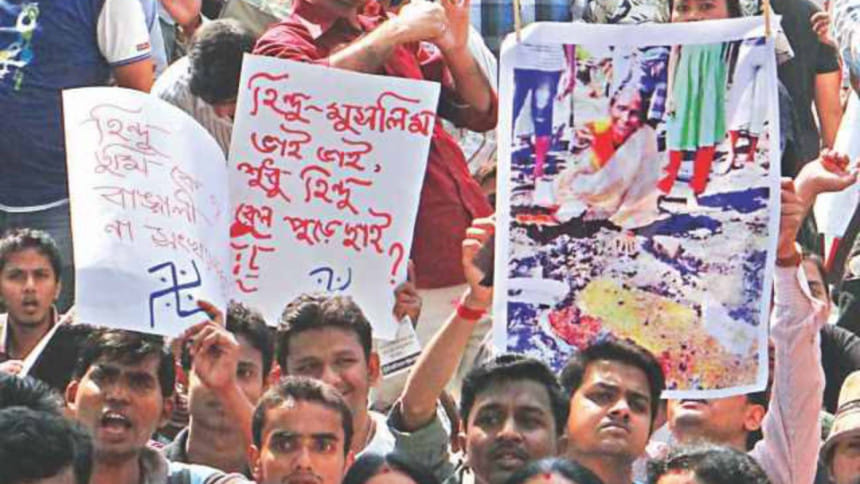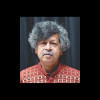Enabling minority voices

Mahatma Gandhi had once said, to judge how civilised a nation is, just look at how it treats its own minorities. Going by this yardstick, Bangladesh does not make a passing grade.
In most countries, minorities suffer from so-called "horizontal inequality." While on paper they may enjoy legal equality, in real life, the playing field remains uneven. Bangladesh is no different.
Of course, minorities are under attack everywhere in the world, not just in Bangladesh. At times of recession, minorities are always scapegoats. Even in the US, the world's richest country, minorities are often blamed for all ills – from continuing unemployment, to job exodus, to domestic crimes. In Europe, the rallying cry of the newly emboldened far-right is: throw all immigrants to the gutter and everything will be fine.
In Bangladesh, members of the majority sound bitter about the imagined political clout and presence of minorities in civil society. Recently, a very well-placed Bangladeshi told me that Hindus now occupy around ten percent of our bureaucracy. "Even the Chief Justice of the Supreme Court is a Hindu," he said, his voice quivering with anger.
I am not sure how many Hindu Secretaries we have had in the last 45 years. Neither could I find reliable statistics on Hindus in public sector jobs. The sole source from which statistics are available is the National Parliament, and those records demonstrate a dismal story. Not counting the short-lived sixth parliamentary elections in 1996, Hindu representation in the last four parliaments, from the fifth to the ninth, as calculated by Raunaque Jahan and Inge Amundson in a paper prepared for Dhaka's Centre for Policy Dialogue and Norway's Chr. Michelsen Institute, has been as follows: 6, 5.3,10 (persons, not percents!). Then, in the controversial 10th Parliament, Hindu representation increased slightly to 14, but still fell far short of the par mark (35).
Interestingly, save for the fifth Parliament (1991), when the Bangladesh Nationalist Party got a single Hindu member elected on its ticket, all other Hindu MPs have invariably been members of Awami League. Given AL's more tolerant approach and careful cultivation of the minority constituencies for years, Hindus have naturally leaned towards it, giving AL a rock solid voting block.
Consequently, AL has reaped benefits from its loyal voting bank but did precious little to assuage average Hindus to feel safe. International human rights groups have been pretty much unanimous in their indictment of the Bangladesh government. Amnesty International, Human Rights Watch, and the US Government's annual reports on religious freedom have all questioned Bangladesh's commitment to protecting its religious minorities. Even the country's own National Human Rights Commission and the Supreme Court have chided the government for failing to protect members of "vulnerable groups."
One reason why the issue of minority rights is not on the political radar screen of the government is the absence of their political voice. In most countries, the Parliament is the venue where a nation's political agenda is discussed and adopted. Giving Hindus and other minorities a stronger voice in our Parliament could help put the spotlight on the status of religious minorities.
Veteran parliamentarian Suranjit Sengupta, in a recent statement made in New York, suggested that Hindus should demand their proportional representation in Parliament. "Pakistan has it, why can't we have the same?" he asked. (To be perfectly clear, Pakistan has reserved seats for minorities, not proportional representation per se). A similar demand has been made by the Bangladesh United Council of Hindus, Buddhists, and Christians, which has called for allocating 60 seats for religious minorities.
The idea of proportional representation has also been embraced by many scholars. Dr. Nazrul Islam, a Bangladeshi economist now working with the United Nations, in his new book, Governance for Development (Palgrave Mcmillan, New York 2016), has argued vociferously on why Bangladesh should consider switching to proportional election. Among other things, such an electoral arrangement will enable minority groups to be represented in accordance with their numerical strength, rendering the legislature to be more inclusive. "They can pursue their interests and demands more freely and directly, without having to depend on bigger parties." As a result, he concludes, proportional election could encourage smaller parties and groups to channel their grievances through the Parliament, rather than through extra-parliamentary means.
Reserve seats or proportional representation, whatever the course may be, the time has come to consider ways to ensure that Bangladesh's minorities have a voice on matters that matter most to them. Parliament could be the place where this could have its most logical beginning.
The writer is a journalist and author based in New York.

 For all latest news, follow The Daily Star's Google News channel.
For all latest news, follow The Daily Star's Google News channel. 








Comments